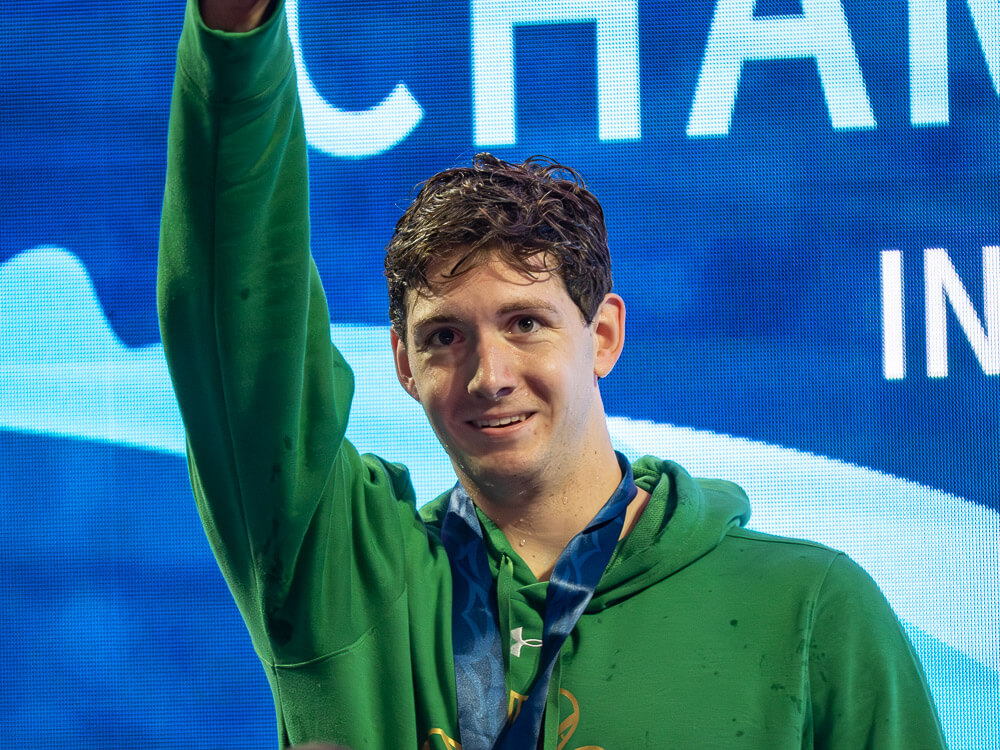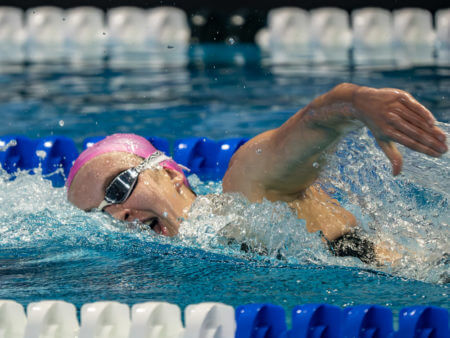U.S. Nationals Already Full of Thrilling Surprises and Upsets

U.S. Nationals Already Full of Thrilling Surprises and Upsets
As Regan Smith crushed the field on the way to a 200 butterfly national title Tuesday evening, the race behind her was too close to call, with the second spot on the World Championships team up for grabs. But on the last 50, it was not Olympic bronze medalist Hali Flickinger, Indianapolis-native teenager Alex Shackell or any of the renowned University of Texas trio making a push for the second spot.
It was Lindsay Looney, whose career-best swim to this point had been a fourth-place finish in the event at the 2021 Olympic Trials. But she was off the radar, particularly given Smith and Flickinger’s experience in the event, Shackell’s impressive personal best in prelims and Dakota Luther’s recent long course renaissance.
But in the final, the last length belonged to Looney. An opening emerged, and she seized it, touching in 2:07.35 to qualify for her first senior-level international team.
That race, the first final of the meet, set the tone for an evening in which five of the 20 swimmers who qualified for Worlds were completely unexpected, swimmers who not considered as legitimate possibilities entering the meet.
In the men’s 200 fly, it was 16-year-old Thomas Heilman cutting two seconds off his best time in a day to get on the team, breaking a National Age Group record that Michael Phelps set on the way to winning a world title 22 years earlier. In the women’s 100 free, Maxine Parker was the unexpected recipient of a Worlds spot as a relay alternate, dropping seven tenths to finish sixth.
Parker was a familiar name to many swimming fans as a contributor to Virginia’s national-title-winning NCAA squad this year. Chris Guiliano, not so much. Who is Chris Guiliano?
He’s a Notre Dame swimmer entering his junior season with the Fighting Irish, and now he’s set to swim the individual 100 free against David Popovici, Kyle Chalmers and the rest of the world’s main stars in Fukuoka.
During the most recent college season, Guiliano was 10th in the 100-yard free at the NCAA Championships, a fine result in an event where 17 men broke 42 in prelims but an easy-to-miss name amid the madness of NCAAs. There was no indication whatsoever that he was going to find his way onto the World Championships team, but sure enough, Guiliano cut 1.19 seconds from his best time between his two swims, finishing second in the final in 47.98.

Jillian Cox — Photo Courtesy: Peter H. Bick
And let’s not forget Jillian Cox and her 10-second personal best in the 800 free. Earlier in the day, friends asked, “What are your odds of making the Worlds team?” Cox’s immediate dismissed her chances. “And I said, ‘Slim to none. Don’t even think about it,’” Cox said.
It turns out that those friends were onto something as Cox held off Claire Weinstein for the No. 2 spot.
In the meantime, plenty of high-profile performers have been eliminated from A-finals. Sure, some have struggled, but others, including Claire Curzan and Natalie Hinds in the women’s 100 free and Brooks Curry in the men’s 100 free, have posted times that might have been good enough for an A-final spot in another year, including at last year’s International Team Trials.
This happens only at an American selection meet. Plenty of nations around the world can produce depth sufficient for a medal-contending relay, even a gold-medal relay, but look through 16 places and the American advantage emerges.
For instance, at the recent Australian Trials, it took 54.77 to qualify for the A-final of the 100 free and 55.90 to make the B-final. In Indianapolis, it was 54.18 for the championship heat and 54.52 for the consols. And remember, this is an event that Australia has dominated, with three consecutive Olympic gold medals in the 400 free relay to show for it.
The downside for the Americans is that the vicious nature of this meet means that the team headed to next month’s World Championships in Fukuoka, Japan, might be one of the least experienced U.S. squads in a while. Sure, there will be veteran presences like Katie Ledecky and Ryan Murphy present, but you never know how rookies will perform in their first taste of international racing.
Watching new contenders emerge with the biggest swims of their lives is the thrill of a selection meet, and swimming is at its best when it is unpredictable. But on the flip side, it’s brutal to witness the disappointment for athletes who come up short of their long-awaited breakout moment or a return to the year’s major meet, whether they are marginally behind in the final or outside the top eight after a tough prelims swim.
And think how quickly the script can flip: just two years ago, Hunter Armstrong was the upset qualifier for the Tokyo Olympics in the 100 backstroke at US Nationals, and his rapid rise continued through 2022, but already this week, he has faced a slight setback as he finished 12th in the 100 free prelims. Yes, Armstrong still has very strong qualification chances remaining with the 50 back (where he is the world-record holder) and 100 back, but the A-final miss meant an unexpected two-day wait, more than 48 hours of being even more nervous about the objective at hand.
Now, one-and-a-half days into the five-day meet, the World Championships roster has already been picked up and shaken vigorously, with plenty of veterans knocked out and rookies shaking the pot. And there’s a long way to go.




